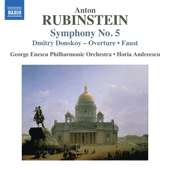|
Back
08/24/2013
Anton Rubinstein: Symphony N° 5 “Russian” in G minor, opus 107 – Dmitry Donskoy: Overture – Faust, opus 68
George Enescu Philharmonic Orchestra, Horia Andreescu (Conductor)
Recording: Bucharest, Romania (July, 1988) – 71’30
Naxos # 8.557005 – Booklet in English

   
Anton Rubinstein’s name is synonymous with piano, but he was also a prolific writer in almost all categories of classical music. Though he hailed of Russian roots, Anton Rubinstein’s music had a more grand tilt toward Western European music with predominating influences of Felix Mendelssohn.
Composed in 1880, the Symphony N° 5’s opening movement, Moderato assai, has many of the dynamics and orchestral coloring one might find in Camille Saint-Saëns’ Samson et Dalila (1877) with its ornery middle section which Rubinstein magnifies with momentous crescendos. The opening bars breathe a sigh of Eastern Europe soupçon.
In the Allegro non troppo we find a thematic, melodic framework opening with the Enescu Philharmonic Orchestra’s jaunty grab beginning with clarinet, followed by oboe, then flute soon to be connected to the strings. This music has a highly modernized twist, bringing to mind something found within Bernstein’s On the Town with a well articulated and formulated A-B-A format.
If woodwinds were to take center stage in the aforementioned section, the brass have their say in the Andante with its moderate tempo of thoughtful recollect. This apportionment is pensive, a sanctuary of peaceful solitude in which Andreescu’s horns play with control and thoughtful reflection. The conclusive Allegro vivace entrées with hints at Rubinstein’s ballet music from the opera Feramors (1863) while the closing bars turn our attention to similarities found in Tchaikovsky’s sparkling finish from his Capriccio italien (1880).
Not unlike the temperate controversy surrounding his own personal life, Rubinstein’s first opera, Dmitry Donskoy was not without its challenges. The “Overture” was presented in concert format in 1850, but censorship delayed the opera’s premiere until April 30, 1852. Dmitry Donskoy enjoyed only four performances before being swept under the carpet. Today, the only memorable mention of this Rubinstein opera comes through the resurrection of the Overture which Naxos has thoughtfully considered to include on this recording. Nationalistically flavored, the weighted 3/4 time signature predominates the score with foreboding angst and impending drama. Nearing completion a sudden tempo and rhythm change occurs whereby the music triumphs into a major key ending with monumental flourish by the trumpet section.
Goethe’s legendary story of relinquishing soul to the devil in exchange for mortal temptation has many interpretations. Those less familiar with Anton Rubinstein’s works outside his six symphonies will find his musical invention a diminutively weighted example as compared to Gounod’s Faust. Nonetheless, it is an attention-grabber. Slow to start, the melodramatic measures take a rampant leap forward approximately five and half minutes into the composition. A brief ray of brass regale shines through at the half way mark that compositionally sounds very similar to that section found within Dmitry Donskoy. This message is quick to wane before settling down into a more solemn canter and fading termination.
This reissue (previously made available under the Marco Polo label) couldn’t be in better hands than with Horia Andreescu. Tracing close by to Rubinstein’s homeland, the George Enescu Philharmonic Orchestra inherently picks up on the tugs of Rubinstein’s Moldavian stress that replicates well onto this Naxos CD. A nice blend of Rubinstein’s works.
Christie Grimstad
|